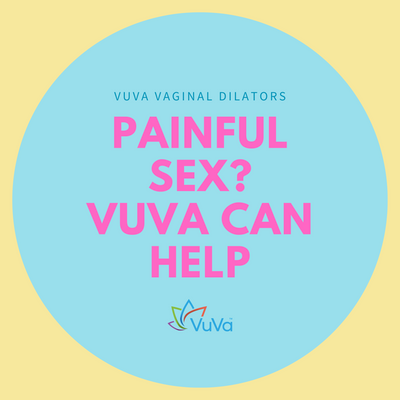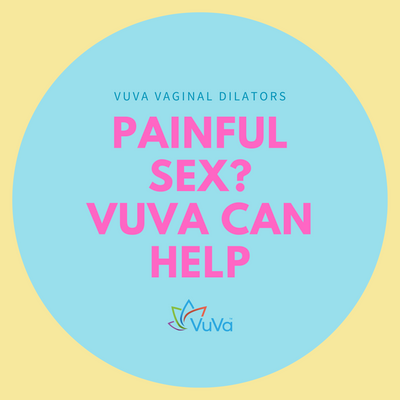
| Tara Langdale
Why is it hard to fit a penis in my vagina?
It is far more common than it might seem that women cannot fit their partner’s penis into their vagina.
When you find that sexual intercourse just isn’t working for you, it’s understandable that you may feel confused, dejected and worried. Sex should be one of the most natural things in the world, and undoubtedly you want to be able to connect with your loved one in this way. Some women experience something called dyspareunia, which means painful sex.

You can purchase VuVa Vaginal Dilators to stretch our vagina at home. Prices start at around $26 dollars for a dilator, depending on size. These WILL HELP you. It is called pelvic floor dilator therapy.
This may be a painful experience, and it can also be one that is full of anxiety. Unfortunately, the two issues tend to go hand in hand. When you feel anxious about sex, you don’t relax and then you tend to tighten up, creating a vicious cycle – and the same thing can happen in reverse. When you feel that your vagina is too tight, you can become anxious about sex, which can cause another secondary condition called "vaginismus", which is involuntary tightening of the muscles.
Sometimes being unable to fit a penis inside you stems from a physical issue, rather than a psychological one. There are lots of reasons you may find it hard to fit a penis in your vagina, and we are here to help you get to the bottom of those reasons so that you may find ways to overcome your difficulties and develop a healthy and fulfilling sex life.
Neodymium Vaginal Dilators are the number one way to relax your muscles for intercourse, they also reduce the fear of penetration. Shop for Dilators Here
It is very important for your peace and relationship happiness that you find the answers you are seeking, and although it can be uncomfortable to discuss such problems with professionals, sometimes this is necessary in order to heal.
The #1 doctor recommended solution to help relieve the tightness "Down There" is private in-home dilator therapy. Click Here to Learn More.
VuVa Vaginal Dilators to help expand vaginal and relax muscles.
An important thing to note
First of all, go easy on yourself. You may feel pressure to perform or to give your partner what they need, but this cannot be at the expense of your own comfort and happiness. If your partner’s penis does not fit easily inside your vagina, you will need patience and understanding while you start your pelvic floor therapy journey.
Don’t rush yourself, and don’t try to push yourself beyond your limits because this is likely to lead to more pain and anxiety, which won’t help you.
We are here to help in whichever ways we possibly can, so in this article we will discuss the potential reasons for your vaginal tightness. We will also make some suggestions as to what you can do…
Why do I have a tight vagina?
If you are having difficulty inserting a penis, it is most likely happening because your vagina is tight. This area of your body consists of lots of muscles and sensitive tissues, so it makes sense that women can have muscle spasms in the pelvic floor or the vagina itself, whether this is due to an underlying physiological issue or a fear or trauma response.
Some of the most common causes of vaginal tightness are:
- Vaginismus: a condition in which the vaginal muscles contract involuntarily, especially when penetration is attempted. Vaginismus can cause pain and discomfort, but although it can take time, it’s certainly possible to treat vaginismus succesfully. The condition has various causes, and we will cover in more detail later in this article.
- Hypertonic pelvic floor: this is the term for an excessively tight pelvic floor. It can develop for several reasons, but more commonly high-impact exercise or excessive physical activities that lead to tension and contraction in this muscle group. Fortunately it is often easily treated using pelvic floor physical therapy.
- Childbirth: although it might seem counterintuitive, childbirth can actually cause the vagina to tighten over time because of increased inflammation or scar tissue in the vagina and pelvic floor
- Medical conditions affecting the pelvic area may also lead to tightness in the vagina. For example, vulvodynia (a vaginal pain condition), vaginal stenosis (shortening or narrowing of the birth canal) and endometriosis.
- Surgery: tightness and spasms in the vagina can be a response to surgery in the pelvic area. An episiotomy (incision in the perineum/the tissue between the anus and vaginal opening) is one example, since the incision can affect the muscles of the vagina.
VuVa Magnetic Dilators can help relax the vagina at home to allow for comfortable penetration. Shop for Dilators.
Why does sexual intercourse cause me pain?
We have to be honest – there are so many potential reasons for sexual discomfort! Even if you have had successful sex in the past, it is possible that sex can become painful at any point in time. It might be that you have developed vaginal tightness as a trauma response, or it could be a physical response to nerve dysfunction or inflammation. You could have some degree of vaginal atrophy, which may include shortening and narrowing of the vaginal canal, because of a hormonal imbalance after menopause or radiation therapy.
You may have an excessively tight pelvic floor, or there may be an infection present. Your partner might simply be a bit too large, or perhaps you don’t feel as safe with him or as connected to him as you need to in order to relax. You may simply be inexperienced at sex, or you may be stuck in your mind due to having performance anxiety.

It is clear that any of the above reasons will destroy your ability to relax and enjoy intercourse, so the chances are you will be lacking in the lubrication that flows naturally when you are relaxed. When you don’t have the necessary amount of lubrication, it is going to be hard to fit a penis into your vagina.
Whatever the underlying reason, if you are experiencing pain or discomfort during sex, or if you are unable to relax enough to fit a penis into your vagina, this is a problem. If you cannot resolve the problem through research and efforts at home, you may need to seek assistance from a qualified professional – be that a sex therapist, a pelvic floor physical therapist, or a gynecological specialist.
Why can’t I fit a penis into my vagina?
When you find yourself in an anxious state, there is a high probability that your vaginal muscles will also be subject to that tension, and they may contract involuntarily. You may be bewildered at how little control you have over these muscular contractions – but don’t worry, there are ways to relax them, and we will get to that later in the article.
Penetration can feel very daunting, and it may even be physically impossible right now. If you are anticipating pain instead of pleasure (whether this a real or imagined possibility), your body is going to do what it can to protect itself. It is an innate physiological response that you may have great difficulty overriding.
If this sounds like you, there is a high probability that you have vaginismus, one of the conditions we mentioned above that is responsible for vaginal tightness. Vaginismus is actually very common, and it can make inserting a penis into your vagina practically impossible.
VuVa Magnetic Dilators can help relax the vagina at home to allow for comfortable penetration. Shop for Dilators.
What is vaginismus?
Vaginismus is classified as a genito-pelvic pain disorder or penetration disorder, so it is a very real problem, even if the cause is psychological. The pain of vaginismus can vary from mild to severe, but whatever the pain level, it causes problems with sexual intercourse and intimacy. Vaginismus can develop at any point in a woman’s life, regardless of her age.
Vaginismus has two types:
- Primary Vaginismus: Patients with primary vaginismus have experienced pain, discomfort, or spasms with vaginal penetration from an early age. Many girls notice their symptoms during their first gynecologic exam, first attempt at tampon use, or first sexual experience. For women with primary vaginismus, their initial symptoms cause hesitancy during future encounters, which can worsen the problem. It is thought that primary vaginismus is among the leading causes of unconsummated marriages.
- Secondary vaginismus: In some cases, women who have had no problems with vaginal penetration go on to develop vaginismus, which is characterized as secondary vaginismus. This may be the result of hormone fluctuations, pelvic pain conditions, marital problems, vaginal childbirth, or another factor. For some women, there is no obvious cause for developing secondary vaginismus.
These can be other triggers/causes of Vaginismus:
- Pelvic radiation therapy: radiation therapy for breast or cervical cancer can cause the vagina to shorten (vaginal stenosis), which can lead to vaginismus
- Menopause: hormonal changes in the menopause can lead to atrophy and dryness, and ultimately, pain during penetration
- Past sexual trauma: sexual abuse or violence can cause sexual dysfunction later in life
- Relationship problems: this can mean it’s difficult to relax and trust your partner, so your vaginal muscles may contract involuntarily
- Pelvic surgery: operations in the vaginal area can create pain or dysfunction later
It is possible to treat vaginismus, even if it takes a multi-pronged approach. Some things you can try at home, but if those alone are not working, it will be necessary to consult an experienced pelvic floor physical therapist.
What should I do if my vagina feels tight?
If your vagina is too tight for sexual intercourse, there are many things you can do to relax and ease discomfort so that (when the time is right), you will be able to have a healthy sex life. If you aren’t having much luck solving the problem alone, you can consult a pelvic floor physical therapist or a Doctor trained in gynecology and sexual health.
Two of the best things you can do to loosen your vagina and get used to penetration at home are:
Pelvic floor stretches
It can really help to try and stretch out the muscles of the pelvic floor and help them to relax. This is easiest through simple yoga-style stretches that gently release the pelvic muscles. Try some of our favorite pelvic floor stretches at home and see how you feel!

Note that there is a big difference between pelvic floor stretches and kegel exercises, which you should avoid if you have a tight vagina unless a physical therapist tells you it is ok. Many people recommend kegels (the contracting and releasing of the pelvic muscles), which is great if you have a loose pelvic floor but can make things a lot worse if you already have tightness in this area. Essentially you would be strengthening the muscles even more, creating further tension and possible pain during sex.
Use vaginal dilators
Vaginal dilators are small cylindrical therapy tools that come in various sizes, all designed for insertion into the vagina in order to stretch it out, relax the muscles gradually and expand your vaginal capacity. Dilators are very helpful for lots of medical conditions, vaginismus to vulvodynia and vaginal stenosis. Neodymium dilators can also increase blood flow, making it easier for your muscles to relax.
You can start out in the comfort of your home with the smallest vaginal dilators and over time, work up to bigger sizes when you are more comfortable doing so. With practice, and as you learn to relax more, it is likely that you will be able to fit a penis inside your vagina.
The VuvaTech site contains vast amounts of information on vaginal dilators, and a range of different vaginal dilators to suit your particular needs. This article on using vaginal dilators is a great place to start. So many women have success with vaginal dilators and can resume a normal sex life with time. The results are very well documented – and we even did our own clinical study so that our customers can have peace of mind!
The Bottom Line: With dedication to pelvic floor therapy with dilators, it is totally possible to have a normal sex life!
VuVa Magnetic Dilators can help relax the vagina at home to allow for comfortable penetration. Shop for Dilators.
Even if right now you find it hard to fit a penis in your vagina, know that this can and will change when you commit to healing. It is a good idea to take your time and try out various methods for relaxation and expanding the capacity of your vagina, and it is wise to consult a professional if you’re finding this difficult. You may have an underlying condition that needs treatment, so it is better to find out what your options are and make an effort to heal it before the condition worsens.
There are many caring professionals out there waiting to help you, from sexual therapists to OB-GYNs and pelvic floor physical therapists. You are likely to get great results from vaginal dilators and pelvic stretching, and these are likely to be recommended by your practitioner.
VuVa Helpful Links:
How do Neodymium Vaginal Dilators work?
7 Reasons for a Tight Vagina and How to Loosen
How to Relax Vaginal Muscles, Vaginismus & Sex
Vaginal Stretching - Keeping in Shape with Dilators
Do Dilators Really Work? Yes, and They can Improve Your Sex Life!
















